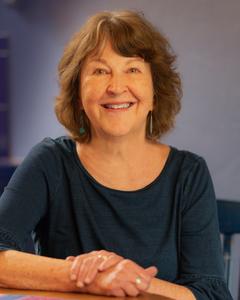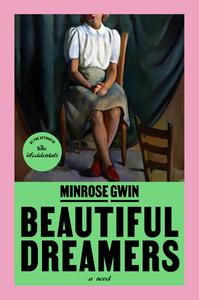
|
|
| photo: Alma Lopez | |
Minrose Gwin is the author of the novels The Queen of Palmyra, a finalist for the John Gardner Fiction Book Award; Promise, which was shortlisted for the Willie Morris Award in Southern Literature; and The Accidentals, which received the 2020 Mississippi Institute for Arts and Letters Award in Fiction. Gwin began her writing career as a journalist and later taught at universities across the country, most recently the University of North Carolina at Chapel Hill, where she was Kenan Eminent Professor of English. Her fourth novel, Beautiful Dreamers (Hub City Press, August 27, 2024), is a story of a precocious teen and her mother, their gay best friend, and the con man who unravels their family.
Handsell readers your book in 25 words or less:
Young Memory, her mother, Virginia, and her mother's gay friend, Mac, make a life together in 1950s Mississippi--until a beautiful, charismatic predator shows up.
On your nightstand now:
The Waters by Bonnie Jo Campbell: I just finished this one, and I don't know when a book has given me such a strong sense of place. The squish of a bog, the snakes, and even the characters themselves are so much part of the natural environment.
The Last Animal by Ramona Ausubel: I'm about halfway through this stunning novel, which puts a grieving mother--a paleobiologist--and her two daughters in search of a way to re-create the extinct woolly mammoth and therefore to help save the planet.
Favorite book when you were a child:
A series beginning with Uncle Wiggily's Adventures by Howard R. Garis. Uncle Wiggily is an old gentleman rabbit who suffers from "rheumatism" and gets into (and out of) scrape after scrape with characters like the "skillery-scalery alligator." These were children's books with an inch-tall spine--no pictures. My grandfather read them to me every night, and then one day I was reading them to him. They taught me about plot and conflict.
Your top five authors:
I'm a literary critic turned novelist, so this is a hard question for me. I'll limit it to the 20th and 21st centuries.
William Faulkner: "The human heart in conflict with itself."
Virginia Woolf: The lyricism of daily life.
Toni Morrison: Black life, told in brilliant prose from the inside out.
James Baldwin: Brilliant insights into racism in America.
Number five is too hard: I can think of dozens.
Book you've faked reading:
Finnegans Wake by James Joyce: I wasn't overly fond of Joyce's masterwork Ulysses, which I read in three graduate classes and liked less and less. Finnegans Wake is even more show-offy and, in my opinion, just plain crazy.
 Book you're an evangelist for:
Book you're an evangelist for:
Small Things Like These by Claire Keegan. This is a beautiful gem of a novel. It's the story of a humble distributor of coal in a small town in Ireland deciding whether to confront the combined power of the Catholic Church and his community, including his wife, when he discovers the nuns' cruel treatment of young women and girls--pregnant out of wedlock--in one of the Church's now-infamous Magdalene Laundries. What will he do to save one girl?
Just one more, please: Life After Life by Jill McCorkle. You can't beat McCorkle for nuanced conflict in domestic life. She is such a wonderfully suggestive writer. This one is about an older couple and the depth and breadth of their complicated lives.
Book you've bought for the cover:
The Last Animal by Ramona Ausubel. The cover is a forlorn-looking baby woolly mammoth. I'm in love with mammoths. I spotted the book in the window of my local bookstore, did a U-turn, and went right in and bought it. For my new novel, Beautiful Dreamers, I did a deep dive into the history of the Mississippi Gulf Coast, back to the Paleo-Indian Age when the land mass stretched all the way to Mexico and animals like mastodons, saber-toothed tigers, and camels (!) roamed the land.
Book you hid from your parents:
Peyton Place by Grace Metalious, for obvious reasons.
Book that changed your life:
I'd have to choose Housekeeping by Marilynne Robinson. When I first read this novel, I was struggling with my memoir, Wishing for Snow, about the loss of my mother to mental illness and then death, and my desperate (and fruitless) attempts to "save" her. This is a novel about floating through a grief and loss that seem to have no end. A mother commits suicide, leaving her two young daughters with their aunt, Sylvie, who's a drifter. It touched me in a deep place, not just because of what I was going through with my own writing but because it was poetry as much as prose. But this tells you nothing. Read it.
Favorite line from a book:
"124 was spiteful." The first sentence of Toni Morrison's Beloved is enigmatic and intriguing. As a young journalist, I was told never to begin a sentence with a number, so this first line stopped me short. Plus it took me a while to realize that 124 was a house, and then I had to wonder how a house could be spiteful. This book taught me so much, but this first line taught me you can break all the rules.
Five books you'll never part with:
Housekeeping by Marilynne Robinson, for all the reasons above.
Absalom, Absalom! by William Faulkner. A stunning masterpiece. I could read it from now until doomsday and draw something new each time.
Beloved by Toni Morrison. Like Absalom, this is a magnificent novel about slavery and its tragic half-lives. Unlike Faulkner's novel, it takes us inside the wrenching experience of slavery inasmuch as that's possible.
The Stone Diaries by Carol Shields. What does one person's existence on this earth come to in the end? This Pulitzer Prize-winning novel traces the trajectory of one woman's outwardly simple, inwardly complex life.
The Collected Works of William Shakespeare (in case I'm ever stranded on a desert island).
Book you most want to read again for the first time:
Absalom, Absalom! by William Faulkner. For that sense of total confusion, shared by the central character, Quentin Compson. I tell students to please not read the CliffsNotes. It's that fog of confusion you need to follow--one that leads not so much to clarity but to the "Truth" of the story, which is that there is no Truth with a capital T, only stories.
Your favorite novel in translation:
The Wall by Marlen Haushofer. I'm not a fan of science fiction, but this novel set me on such firm footing that I couldn't resist it. A woman in the European countryside is cut off from the rest of world by a wall of glass, perhaps created by a nuclear blast. She has a cow and a cat, and her own fragile life. Can she survive? But it's really about how one woman's connection to the natural world contrasts with the terrible destructiveness of humankind.

